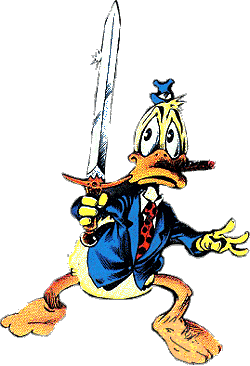 Whatever you may think about the ethics of foie gras (my own view is that producing it violates a duty, that producing it nevertheless violates no right, that consuming it violates no duty, and that refraining from consuming it is nevertheless a permissible specification of an imperfect duty – but like I said, never mind), there’s something heartening about the insouciantly defiant attitude of these lawbreakers. They’re not storming the citadel, they’re treating the citadel as irrelevant.
Whatever you may think about the ethics of foie gras (my own view is that producing it violates a duty, that producing it nevertheless violates no right, that consuming it violates no duty, and that refraining from consuming it is nevertheless a permissible specification of an imperfect duty – but like I said, never mind), there’s something heartening about the insouciantly defiant attitude of these lawbreakers. They’re not storming the citadel, they’re treating the citadel as irrelevant.
Oh, to see the State’s edicts cheerfully ignored en masse, La Boétie style, on issues more important than foie gras!
In completely unrelated news, this is unwelcome.
If producing foie gras violates a duty, but consuming it does not, where does that leave middlemen? On the one hand, the restauranteur (or other distributor) is, economically, a producer of the foie gras in the process that leads to the consumer, but, on the other hand, I reckon you mean only production of the thing itself (rather than the service of bringing it to the consumer), since I speculate that your reasoning is that it is only those involved in the fattening process (supply side) who actively harmed animals, whereas those (consumers and lower-order producers) who demand the product are only asking for the harm to be done…?
No, I don’t think that’s what you mean. But it’s my best guess.
Also, would you mind pointing me to an explanation of your statement about imperfect duties? I seem to recall it has something to do with duties that are not specifically mandated, but are mandated in some more general form. So, in this case, maybe it means that we have a duty to be humane (?) to animals, but not necessarily to specify that making foie gras is inhumane…?
-H
Does this mean that it’s O.K. to pay someone to slit a puppy’s throat, but not to do it yourself?